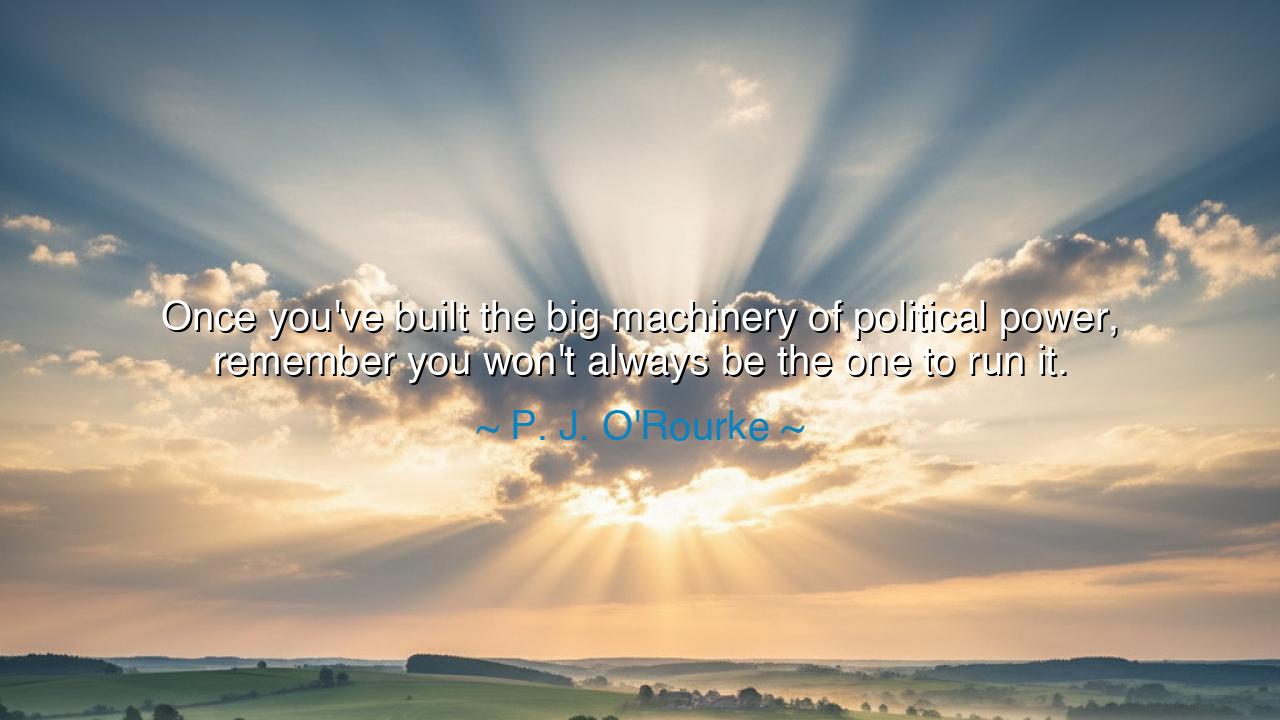
Once you've built the big machinery of political power, remember
Once you've built the big machinery of political power, remember you won't always be the one to run it.






The words of P. J. O’Rourke—“Once you've built the big machinery of political power, remember you won't always be the one to run it.”—are a sober warning to rulers, leaders, and builders of empires. They remind us that political power, once created, does not remain in the hands of its architects forever. The machinery, vast and enduring, will outlive its makers, and those who inherit it may wield it for ends far different from those first imagined. Thus, what one builds in ambition may become, in time, a tool of oppression or folly.
This utterance speaks of the impermanence of control. A throne, once taken, does not guarantee eternal dominion. A constitution, once written, will be read by generations yet unborn. Armies, laws, and institutions, once raised, will serve future masters whose values may oppose those of their creators. O’Rourke’s words shine with the truth that power is not merely possession, but stewardship—and those who build must reckon with the possibility of misuse when their hands are gone.
History offers a striking lesson in the tale of Napoleon Bonaparte. He forged a mighty engine of empire, reshaping Europe through laws, armies, and institutions. Yet when he fell, the machinery he built was not destroyed; it was seized by kings, nations, and rivals, who bent it toward their own purposes. The Napoleonic Code endured, but often in ways Napoleon could not control. So too does O’Rourke’s wisdom remind us: once created, the structures of power belong to history, not to the will of a single man.
The quote also carries the weight of caution and humility. Many seek to expand government, to build systems of immense authority, imagining themselves always in command. Yet they forget that power is fickle, and rulers rise and fall. The very machinery they designed to strengthen their hand may one day be turned against them. What is built for safety may become a prison; what is built for glory may become an instrument of tyranny.
Let this wisdom endure across the ages: when you shape the engines of political power, build them not for yourself, but for justice, for posterity, and for restraint. For you will not always sit in the seat of command, but others will take your place. As O’Rourke warns, the machinery will remain—and only if it is crafted with wisdom and virtue will it serve the good when new hands grasp its levers. To forget this is to sow the seeds of ruin for generations to come.






Tthong
There’s a haunting truth in this quote that goes beyond politics—it’s about human arrogance. People love to build power, but they rarely think about the consequences once it slips from their grasp. The line feels almost prophetic, like a warning to every generation that control is fleeting. How many civilizations have fallen because they forgot that the machinery of power keeps running long after the hands change?
DTDuc Trung
I interpret this as a critique of political hubris. Many leaders think they can shape systems to serve their ideals forever, but history proves otherwise. It’s sobering to consider how easily power infrastructure—once established—can be turned against its founders. Shouldn’t every law or policy come with a moral stress test: ‘Would I still support this if my opponent were enforcing it?’
QBduc quyet bang
O’Rourke’s observation feels both cynical and deeply practical. He’s reminding us that power is a tool, not a possession. Once the machinery is built, anyone can use it—for good or ill. It makes me wonder: do societies ever learn this lesson? We keep building massive bureaucracies or surveillance systems thinking we’ll manage them wisely, only to regret it later when someone else abuses them.
MTNguyen Mai Thy
This quote really makes me pause. It’s not just about politics—it applies to any form of authority. When we create systems—laws, companies, or even family legacies—how often do we think about who comes next? It feels like a lesson in humility: power is temporary, but structures endure. Perhaps that’s why the most dangerous mistake is assuming you’ll always control what you’ve created.
Hhoa
I think this is one of the most insightful warnings about power I’ve ever read. It perfectly captures how short-sighted leadership can be—people build institutions for control but forget that power changes hands. It raises a troubling question: can political systems ever be designed to resist corruption once the ‘good’ people are gone? Maybe the true test of leadership is building something ethical even in the wrong hands.